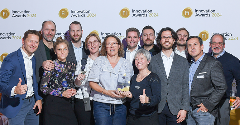News
Unilever aims to ‘make sustainable living commonplace’ with responsibly produced packaged goods [Interview]
8 Nov 2022
Thanks to their sheer scale, multinational corporates can have a positive impact when they adopt sustainable practices. Unilever aims to do so via regenerative agriculture, plant-based products, food waste reduction, and nutrient fortification, says Dorothy Shaver, global food sustainability director at the company.
Soup-to-soap manufacturer Unilever has set itself the target of hitting net zero emissions from all products to point of sale by 2039. It aims to achieve this through various action points, including regenerative agriculture, packaging changes, food waste reduction, meat reduction and plant-based products.
“Unilever’s ambition is to make sustainable living commonplace,” Shaver told Ingredients Network. “Therefore, [we] produce products made with ingredients that are grown and sourced sustainably and regeneratively in packages that cause less environmental harm and produce less waste.”
![Unilever aims to ‘make sustainable living commonplace’ with responsibly produced packaged goods [Interview]](/47/pdcnewsitem/11/93/47/FiE22%20Speaker%20Interview_Dorothy%20Shaver_Unilever.png)
Shaver will be a keynote speaker at Fi Europe this year, held from 6 to 8 December in-person in Paris. Click here to register.
“The 2019 EAT-Lancet report showed that a diet rich in plant-based foods and with less animal-sourced foods offer both health and environmental benefits,” she added.
Unilever’s nutrition and ice cream business groups are headquartered in Rotterdam, the Netherlands. Unilever has a number of food brands that offer plant-based options, including Hellmann’s mayonnaise, Ben & Jerry’s ice cream, Magnum ice cream, and Knorr soups and seasonings, while the Vegetarian Butcher, a Dutch plant-based brand that Unilever acquired in 2018, has a full range of plant-based meat replacements.
Supporting regenerative agriculture practices
The company is working with suppliers and farmers to grow ingredients in ways that protect and regenerate the land and its resources while improving the livelihoods of farmers. It has established a roadmap to grow key ingredients in food and ice cream products following Regenerative Agriculture Principles.
Knorr, which is Unilever’s largest food brand, has set a goal of growing 80% of its key ingredients following Unilever’s Regenerative Agriculture Principles by 2026.
In Spain, for instance, the multinational has partnered with tomato farmers to use cover crops to improve soil health and reduce dependence on chemical inputs. In the US, it is working with its suppliers to grow rice in ways that will reduce its demand for water and cut methane emissions.
“This means they are grown using less water, pesticides, and fertilizers, following practices that improve soil health and biodiversity with lower climate impact,” Shaver said.
Science-backed solutions for healthy eating habits
Unilever is also making products healthier by increasing the nutrient content via fortification and using more nutritious ingredients, with the commitment to double the number of products with positive nutrition by 2025.
As a registered dietitian, this is a topic that is close to Shaver’s heart.
“Eating habits are personal and deep-rooted,” she said. “I aim to inspire people to eat a wide variety of vibrant, nutrient-packed plants for the betterment of people and the planet. I love leafy greens, beans, a mix of grains, lots of nuts and a little sweet treat. I work to help others – in my personal and professional life – to also love these foods.”
In addition to her role at Unilever, Shaver is a founding board member of the Food for Climate League. It is a Food for Climate League is a trailblazing, women-led nonprofit working to make climate-smart eating the norm.
“We create toolkits, programs, and campaigns — founded in original behavioral science research — to shift the perception of climate-smart eating and drive engagement. We do this by connecting the dots between sustainable food culture and people's unique needs, values, and cultures.”
Related news

Oat Barista: Innovation for game-changing beverages
20 Nov 2025
Oat Barista is a clean label, sustainable, and innovative drink base specifically designed to create the perfect foam in one single ingredient.
Read more
Nitrites: Pressure grows on UK to follow EU’s lead
20 Nov 2025
Pressure is growing on the UK to follow the EU’s lead after the bloc revised its regulations on the permitted levels of nitrites and nitrates in cured meats.
Read more
Empowering innovation in fortification and colouration
13 Nov 2025
Divi’s Nutraceuticals offers a large portfolio of innovative, high-quality ingredients for foods, beverages, and supplements, with bespoke solutions and expert support for product success.
Read more
Danone highlights digestive health as potential ‘tipping point’ for food industry
13 Nov 2025
Danone is betting on a food industry “tipping point” that will bloat the market for healthy products, particularly those related to gut health.
Read more
Standing Ovation and Bel scale up casein production from dairy co-products
11 Nov 2025
Foodtech company Standing Ovation has partnered with cheese specialist Bel Group to manufacture dairy serums for industrial-scale casein production via precision fermentation.
Read more
AI attraction means foodtech startups must ‘prove’ rather than ‘promise’
4 Nov 2025
Reports suggest that artificial intelligence (AI) is sucking investment from foodtech and agritech, but investors say the picture is complicated.
Read more
Will postbiotics become the go-to functional ingredient?
3 Nov 2025
Postbiotics show significant promise for the functional foods market due to their safety profile and beneficial bioactive properties, research suggests.
Read more
Meet the finalists of the Fi Europe Innovation Awards 2025
31 Oct 2025
Who made it to the shortlist of the Fi Europe Innovation Awards 2025? Read about the 23 companies making food and drink products healthier and manufacturing processes more efficient.
Read more
Penguin and Club bars no longer classed as chocolate
30 Oct 2025
Penguin and Club bars can no longer be classified as chocolate after the pladis-owned McVitie’s brands turned to cheaper alternatives amid the ongoing cocoa crisis.
Read more
Shorter drying time, sweeter success!
30 Oct 2025
Curious about cost-effective, sustainable and delicious candy making? Stefan Wessel reveals how Avebe’s solutions reduce drying time and energy use by up to 50%.
Read more